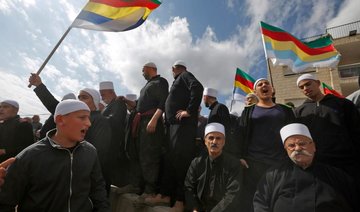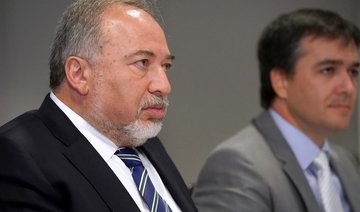AMMAN: Syrian residents of the occupied Golan Heights have expressed concern that the current violence in the area might lead to further Israeli expansion there.
Israel has occupied around two-thirds of the Golan Heights since 1967, and in 1981 it passed the Golan Heights Law, extending its control to the rest of the territory. The UN condemned that move and every other country recognizes the Golan Heights as occupied Syrian territory.
Salman Fakhreddine, a researcher and analyst from the village of Majdal Shams in the occupied Golan Heights, told Arab News that Israel’s political maneuvering suggests it is looking to expand its current occupation.
On Friday, a car bomb attack on the village of Hadar — situated near the disengagement line that divides the Syrian-controlled part of the Golan Heights from that occupied by Israel — killed at least nine people. Hadar has a significant Druze population, and on Friday night a spokesman for the Israeli army announced Israel was ready to prevent the village “from being harmed or occupied, as part of our commitment to the Druze population.”
“They are using the minority Druze residents of the village to prepare for a possible military intervention,” warned Fakhreddine.
While the village of Hadar is regarded as part of the de-escalation zone, Hayyat Tahrir Al-Sham, the militant group that evolved from the Al-Qaeda-backed Al-Nusra Front, and which carried out the attack on Friday, is not part of that agreement.
Syrian opposition fighters and militant groups control about 70 percent of the area surrounding Hadar.
Fakhreddine told Arab News that Hadar has suffered huge losses in the Syrian Civil War. “Over 100 have been killed (there) in the last three years and 15 have been killed in the last few days,” he said. “We hear the shooting and the shelling from our homes.”
A military strategist who asked to remain anonymous told Arab News that the attack on Hadar would have been an attempt by opposition forces to break the Syrian army’s hold on the area.
If Hadar falls, he said, there is a danger that the Syrian army’s 80th Brigade Unit, currently stationed in the area, will also fall, which could give militants and rebel forces the opportunity to reach the outskirts of Damascus.
Nizar Ayoub, head of the Arab Human Rights Center in the Golan Heights, echoed Fakhreddine’s concerns that Israel’s statement is an attempt to lay the groundwork for military expansion in the Golan Heights.
“What we are seeing in Syria is a proxy war in which international and regional forces are playing a leading role,” Ayoub said. “For its part, Israel is using the fact that it is being encouraged by Druze leaders in Israel to protect their brethren in Syria to intervene militarily under the guise of helping the people of Hadar.”
Israeli Prime Minister Benjamin Netanyahu has said that Israel is simply safeguarding its northern borders, adding: “We are also keeping sympathy for our Druze brothers.”
“We are all for protecting civilians and we support intervention,” Ayoub told Arab News. “But any intervention must have the approval of the UN Security Council and should not have any lasting benefit to those intervening.”
He added that since the Israeli statement on Friday, the area has been “unusually quiet” — an indication that the statement has had some effect as a deterrent.
Israel has been providing medical support to many opposition militants, including the former Al-Nusra forces, as well as Syrian civilians caught in the fighting.
Israel has often said that it would like to create a 20-40-km-wide security buffer zone to the east of its current borders to help protect its troops in the occupied Golan Heights.
For Fakhreddine, though, the blame for any Israeli expansion in the area, or for further rebel attacks, lies with one man: Bashar Assad.
“Assad is responsible for what happens in Syria,” Fakhreddine said. “The country’s imminent division is something real. He doesn’t care about Syrians. He deals with us as if we are a farm he owns. Nothing more.”
























